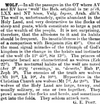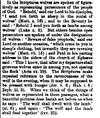Edward
Puritanboard Commissioner
"“Beware of false prophets, who come to you in sheep's clothing but inwardly are ravenous wolves." Matthew 7:15
A question was raised on another thread as to how PBers would define a 'wolf in sheep's clothing' particularly in connection with a person's state of election or salvation.
If anyone wants to weigh in, please leave the persons and issues being discussed on the other thread on that other thread, and let's address things in a general or universal sense here.
A question was raised on another thread as to how PBers would define a 'wolf in sheep's clothing' particularly in connection with a person's state of election or salvation.
If anyone wants to weigh in, please leave the persons and issues being discussed on the other thread on that other thread, and let's address things in a general or universal sense here.



